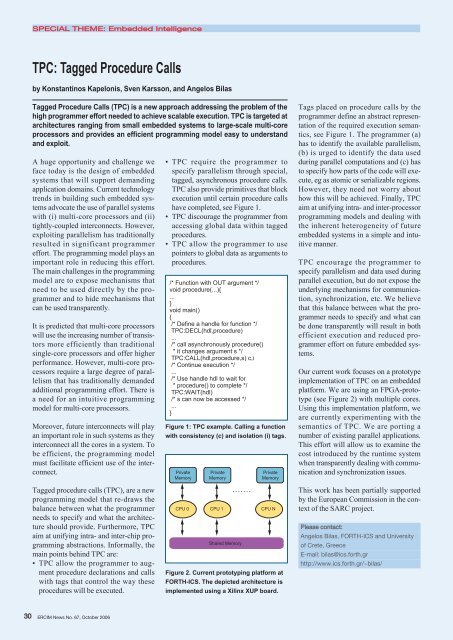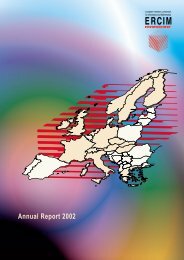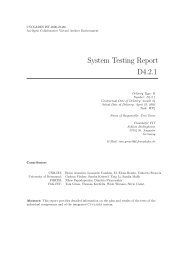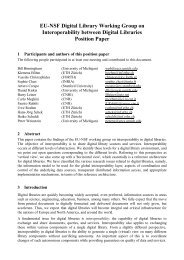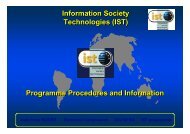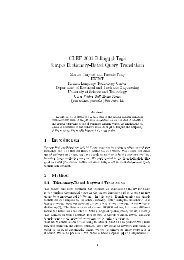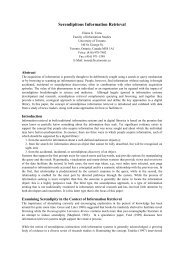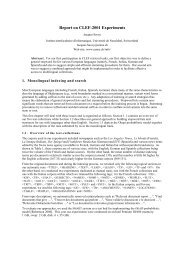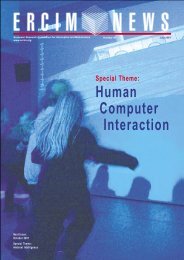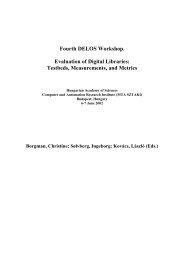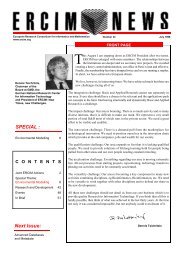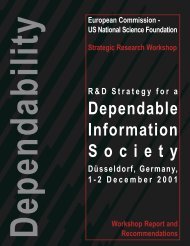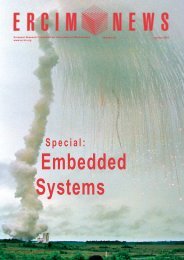Towards a Platform for Widespread Embedded Intelligence - ERCIM
Towards a Platform for Widespread Embedded Intelligence - ERCIM
Towards a Platform for Widespread Embedded Intelligence - ERCIM
Create successful ePaper yourself
Turn your PDF publications into a flip-book with our unique Google optimized e-Paper software.
30<br />
SPECIAL THEME: <strong>Embedded</strong> <strong>Intelligence</strong><br />
TPC: Tagged Procedure Calls<br />
by Konstantinos Kapelonis, Sven Karsson, and Angelos Bilas<br />
Tagged Procedure Calls (TPC) is a new approach addressing the problem of the<br />
high programmer ef<strong>for</strong>t needed to achieve scalable execution. TPC is targeted at<br />
architectures ranging from small embedded systems to large-scale multi-core<br />
processors and provides an efficient programming model easy to understand<br />
and exploit.<br />
A huge opportunity and challenge we<br />
face today is the design of embedded<br />
systems that will support demanding<br />
application domains. Current technology<br />
trends in building such embedded systems<br />
advocate the use of parallel systems<br />
with (i) multi-core processors and (ii)<br />
tightly-coupled interconnects. However,<br />
exploiting parallelism has traditionally<br />
resulted in significant programmer<br />
ef<strong>for</strong>t. The programming model plays an<br />
important role in reducing this ef<strong>for</strong>t.<br />
The main challenges in the programming<br />
model are to expose mechanisms that<br />
need to be used directly by the programmer<br />
and to hide mechanisms that<br />
can be used transparently.<br />
It is predicted that multi-core processors<br />
will use the increasing number of transistors<br />
more efficiently than traditional<br />
single-core processors and offer higher<br />
per<strong>for</strong>mance. However, multi-core processors<br />
require a large degree of parallelism<br />
that has traditionally demanded<br />
additional programming ef<strong>for</strong>t. There is<br />
a need <strong>for</strong> an intuitive programming<br />
model <strong>for</strong> multi-core processors.<br />
Moreover, future interconnects will play<br />
an important role in such systems as they<br />
interconnect all the cores in a system. To<br />
be efficient, the programming model<br />
must facilitate efficient use of the interconnect.<br />
Tagged procedure calls (TPC), are a new<br />
programming model that re-draws the<br />
balance between what the programmer<br />
needs to specify and what the architecture<br />
should provide. Furthermore, TPC<br />
aim at unifying intra- and inter-chip programming<br />
abstractions. In<strong>for</strong>mally, the<br />
main points behind TPC are:<br />
• TPC allow the programmer to augment<br />
procedure declarations and calls<br />
with tags that control the way these<br />
procedures will be executed.<br />
<strong>ERCIM</strong> News No. 67, October 2006<br />
• TPC require the programmer to<br />
specify parallelism through special,<br />
tagged, asynchronous procedure calls.<br />
TPC also provide primitives that block<br />
execution until certain procedure calls<br />
have completed, see Figure 1.<br />
• TPC discourage the programmer from<br />
accessing global data within tagged<br />
procedures.<br />
• TPC allow the programmer to use<br />
pointers to global data as arguments to<br />
procedures.<br />
/* Function with OUT argument */<br />
void procedure(...){<br />
...<br />
}<br />
void main()<br />
{<br />
/* Define a handle <strong>for</strong> function */<br />
TPC:DECL(hdl,procedure)<br />
...<br />
/* call asynchronously procedure()<br />
* it changes argument s */<br />
TPC:CALL(hdl,procedure,s) c,i<br />
/* Continue execution */<br />
...<br />
/* Use handle hdl to wait <strong>for</strong><br />
* procedure() to complete */<br />
TPC:WAIT(hdl)<br />
/* s can now be accessed */<br />
...<br />
}<br />
Figure 1: TPC example. Calling a function<br />
with consistency (c) and isolation (i) tags.<br />
Figure 2. Current prototyping plat<strong>for</strong>m at<br />
FORTH-ICS. The depicted architecture is<br />
implemented using a Xilinx XUP board.<br />
Tags placed on procedure calls by the<br />
programmer define an abstract representation<br />
of the required execution semantics,<br />
see Figure 1. The programmer (a)<br />
has to identify the available parallelism,<br />
(b) is urged to identify the data used<br />
during parallel computations and (c) has<br />
to specify how parts of the code will execute,<br />
eg as atomic or serializable regions.<br />
However, they need not worry about<br />
how this will be achieved. Finally, TPC<br />
aim at unifying intra- and inter-processor<br />
programming models and dealing with<br />
the inherent heterogeneity of future<br />
embedded systems in a simple and intuitive<br />
manner.<br />
TPC encourage the programmer to<br />
specify parallelism and data used during<br />
parallel execution, but do not expose the<br />
underlying mechanisms <strong>for</strong> communication,<br />
synchronization, etc. We believe<br />
that this balance between what the programmer<br />
needs to specify and what can<br />
be done transparently will result in both<br />
efficient execution and reduced programmer<br />
ef<strong>for</strong>t on future embedded systems.<br />
Our current work focuses on a prototype<br />
implementation of TPC on an embedded<br />
plat<strong>for</strong>m. We are using an FPGA-prototype<br />
(see Figure 2) with multiple cores.<br />
Using this implementation plat<strong>for</strong>m, we<br />
are currently experimenting with the<br />
semantics of TPC. We are porting a<br />
number of existing parallel applications.<br />
This ef<strong>for</strong>t will allow us to examine the<br />
cost introduced by the runtime system<br />
when transparently dealing with communication<br />
and synchronization issues.<br />
This work has been partially supported<br />
by the European Commission in the context<br />
of the SARC project.<br />
Please contact:<br />
Angelos Bilas, FORTH-ICS and University<br />
of Crete, Greece<br />
E-mail: bilas@ics.<strong>for</strong>th.gr<br />
http://www.ics.<strong>for</strong>th.gr/~bilas/


